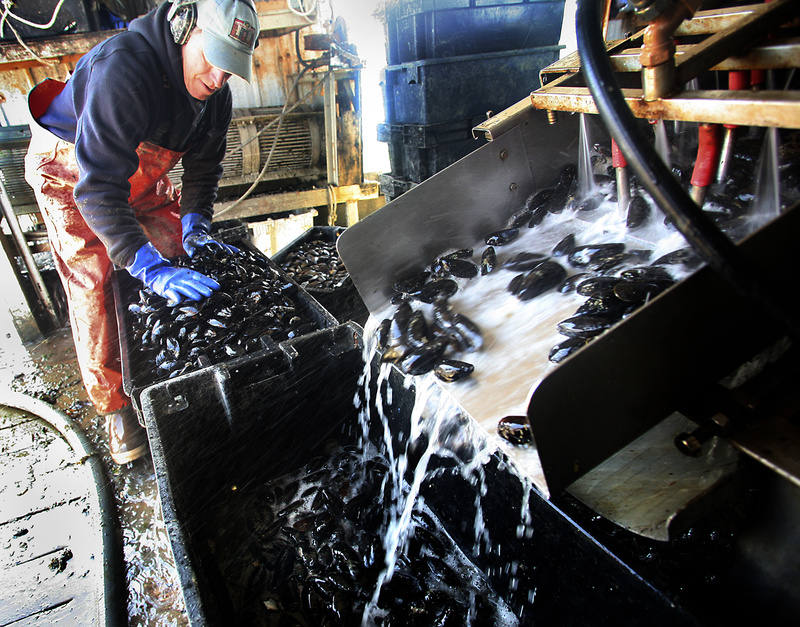CASCO BAY -— New listing: Turnkey blue mussel farm with strong brand awareness, three mussel rafts with new predator nets, 60,000 pounds of market-ready inventory, a 41-foot processing barge filled with equipment, a 27-foot commuter boat with trailer and state leases.
Asking price: $275,000.
“And part of the package are a lot of little tips,” said owner Toleff Olson, who is throwing in 160 hours of special training.
Olson, of South Portland, is selling his 10-year-old Bangs Island Mussels farm off Clapboard Island, believed to be the first commercial rope-grown mussel operation on the East Coast. Olson is focusing full time instead on his seaweed venture, Ocean Approved, which is one of the first, if not the only, cultivated kelp businesses in the country.
Olson is hoping his mussel farm will catch the eye of an enterprising Mainer who can see the advantages of working on the open water rather than in a cubicle.
As his business partner, Paul Dobbins of Falmouth, points out, it is hard to beat the 1.5-mile commute out to the processing barge from Falmouth Town Landing, a ride that often features glimpses of bald eagles and nesting ospreys.
“And you cannot ask for a more beautiful office,” said Dobbins.
Olson is getting out of blue mussel farming at a time when the sector is growing. Sebastian Belle, executive director of the Maine Aquaculture Association, said the market for the edible bivalves is booming.
“Farm-raised has a very high meat yield and they are a reasonably priced seafood,” he said.
Belle said he expects to see a big turnover in aquaculture farms in the future as the first generation of aquaculturists who set up the state’s trout and oyster farms in the 1970s begins to retire. Those early operators tended to hold graduate degrees from marine biology programs, and idealistic ambitions.
“They were the Cousteau kids, who were viewing aquaculture as a way to feed the world,” said Belle, referring to the pioneering marine conservationist Jacques-Yves Cousteau.
The new generation of aquaculturists has a more practical approach. Many are ex-commercial fishermen who have been driven out of the groundfishing business, or young adults from fishing families who cannot obtain one of the limited number of state permits for other fisheries.
In Maine, the wild harvest of blue mussels is much greater than the cultivated harvest. In 2009, the roughly 33 fishermen licensed to use draggers on wild mussel beds landed 14.7 million pounds of blue mussels worth $1.2 million, according to preliminary data from the state Department of Marine Resources. The state’s 10 mussel farms, about half of which are rope-grown operations, produced a combined 805,899 pounds of mussels, worth $999,000 last year.
Working a mussel farm is physically demanding. There can be frequent shutdowns because of toxic red tide or heavy rains that degrade water quality.
But the job is not particularly time-consuming, said Olson. In the winter, he heads out to the barge twice a week with his helper, Bernie Sutherland of Portland. In the busy summer season, he takes on another couple of workers and adds another day or two a week.
“There is plenty of time left to surf,” said Olson.
The mussel ropes are attached to rafts, protected by thick nets from eider ducks, which have a voracious appetite for the shellfish.
The water around the rafts is particularly clear, thanks to the mussels, which filter 25 gallons of water each in 24 hours.
With the help of a power winch, Olson and Sutherland haul up the 35-foot ropes, each loaded with 250 to 300 pounds of mussels as well as barnacles, starfish, sea squirts and other freeloaders. The mussels are mechanically knocked off the ropes and shoveled into a sorter. Undersized mussels, called spat, are collected for inclusion in the next crop.
The sorted mussels are then fed into a debearding machine. They emerge clean and ready for market.
The farmers then wash down all evidence of mussels from the decks so as not to attract annoying seagulls, one of Olson’s little tips.
While Olson and Dobbins will reveal financial details of the operation to serious buyers only, they say the farm makes enough to support two families.
Consummate salesmen, the two say demand for mussels began to skyrocket once the stock market turned around. Last year, they doubled their sales, said Olson, as he served visitors a platter of mussels with curried mayonnaise and a bowlful of his sea kelp slaw.
Olson said he takes great pride in the reputation of his mussels and wants that reputation to continue under the new owners. The Bangs Island mussels have national brand recognition and have been featured on the Martha Stewart show, Bon Appetit and Gourmet magazines.
Mussel farming on suspended ropes is considered an environmentally benign form of aquaculture compared to finfish farming, which can pollute and cause other environmental problems, another positive selling point, said Scott Balfour, broker for Olson’s mussel business.
Balfour said while he doesn’t have a lot of experience selling mussel farms – this is his first – the demand for locally produced and organic food should make the Bangs Island Mussels an attractive business.
Staff Writer Beth Quimby can be contacted at 791-6363 or at:
bquimby@pressherald.com
Send questions/comments to the editors.




Success. Please wait for the page to reload. If the page does not reload within 5 seconds, please refresh the page.
Enter your email and password to access comments.
Hi, to comment on stories you must . This profile is in addition to your subscription and website login.
Already have a commenting profile? .
Invalid username/password.
Please check your email to confirm and complete your registration.
Only subscribers are eligible to post comments. Please subscribe or login first for digital access. Here’s why.
Use the form below to reset your password. When you've submitted your account email, we will send an email with a reset code.